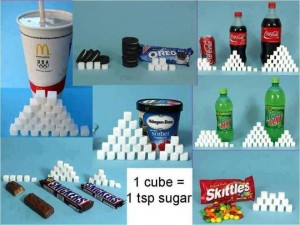In the dental profession we have been warning about the intake of too much sugar for many years, but why is this? It was originally the ancient Greeks that noticed that if they ate too many soft sweet things it destroyed their teeth, at first they thought it was the sugar which was directly responsible for attacking the teeth however we know today that this is not the case.
When you eat sugar not only does it act as a food for you, it acts as a food for the streptococcus bacteria in your mouth. As these bacteria feed on the sugar they excrete acids and it is these acids which eat away and attack the enamel outer layer of your teeth. These bacteria can be found in the plaque which often collects in between teeth or around the tooth/gum margin, this is why it is important to keep your teeth cleaned daily, flossing and rinsing to ensure that the plaque does not build up and give somewhere for the bacteria to hide.
So, back to our original question..
How much sugar is too much sugar?
The Journal of Dental Research carried out a systematic review to inform WHO guidelines on the effects of restricting sugar intakes in various age groups. The research looked at % of sugar in a daily diet and its relationship to the onset of decay. The problem has been that the research has been interpreted misguidedly.
Various newspapers have unfortunately taken the step of converting this % of sugar into a spoonful amount, probably to make it easier for the general public to work out how much sugar they should be having. These Papers have converted this into between 5 and 7 teaspoons per day. Unfortunately doing this leads people to assume that they can have 5 or 7 teaspoons per day on their cereal, coffee , tea or anywhere else they add sugar.
The biggest problem is they forget that most of the sugar we eat daily is hidden within foods, not added by us afterwards. If we only count the spoonfuls of sugar we add to our food then we will be dramatically exceeding the recommended amounts!
The research reported the following results in their abstract:
- 42 out of 50 of the studies in children, and 5 out of 5 in adults, reported at least one positive association between sugars and dental decay
- there was “moderate quality” evidence showing a lower risk of dental decay when sugar intake is less than 10% of calorie intake, compared with more than 10%
- there was “very low quality” evidence showing a lower risk of dental decay when sugar intake is less than 5%, compared with 5-10% of calorie intake
So it seems that the research is suggesting if we keep our sugar intake below 10% of calorie intake then there is ‘moderate quality’ evidence to show a lower risk of dental decay… So perhaps we should start doing that!
How do we know how much sugar we are eating?

We thought we’d give a rough guide to the amount of sugar contained within various food stuffs so that you can be sure to keep your intake ideally less than 10%.
- A can of Coke contains approximately 11 spoonfuls of sugar increasing to 28 spoonfuls in the largest bottle
- a McDonald’s Coke also contains 28 spoonfuls of sugar
- a tub of Haagen Das ice cream contains 21 spoonfuls of sugar
- the average chocolate bar contains around 10 spoonfuls of sugar
- one breakfast pop tarts contains approximately 4 1/2 spoonfuls of sugar
- One bowl of frosted cornflakes contains 6 spoonfuls of sugar
- One NutriGrain Contains 3 1/2 spoonfuls of sugar
- A Starbucks Mocha Frappuccion contains 12 spoonfuls of sugar
- A McDonald’s Medium chocolate milkshake contains 28 spoonfuls of sugar
Statistics taken from Sugar Stacks – They have included all forms of sugar in these statistics and have simply turned it into a ‘spoonfuls’ amount to make it easier to understand.
Summary
Research over the years has clearly shown that Eating too much sugar will directly impact oral health, the only question lies around exactly how much is too much. The new research seems to suggest that when we keep sugar intake below 10% (Or around 5 to 7 spoonfuls of all sugar intake per day) there is moderate quality evidence showing a lower risk of dental decay, and that can only be good.
Our advice therefore is to look at the quantity of sugar in the food that you eat, remember that sugar can be from many sources and it’s not just the sugar which we add to food that counts.
So how much sugar do you eat per day? Let us know in the comments section below this blog post, and then tell us what you’re going to do to cut down…
Dr Nishan Dixit
Latest posts by Dr Nishan Dixit (see all)
- Dr Dixit is the new President of British Academy of Cosmetic Dentistry - 28 May 2020
- Does Invisalign hurt? - 9 March 2020
- How Long Does Invisalign Take? - 27 February 2020

